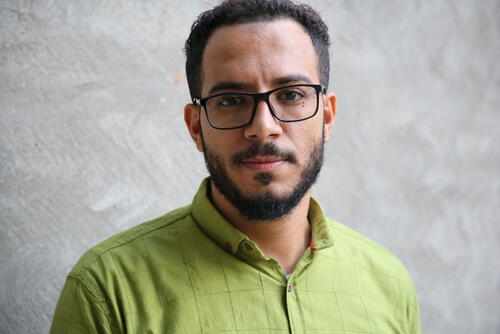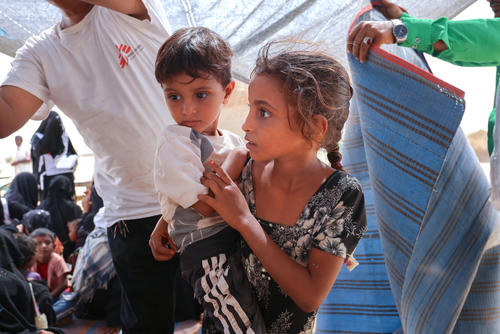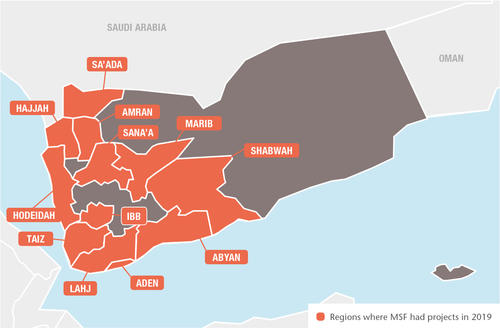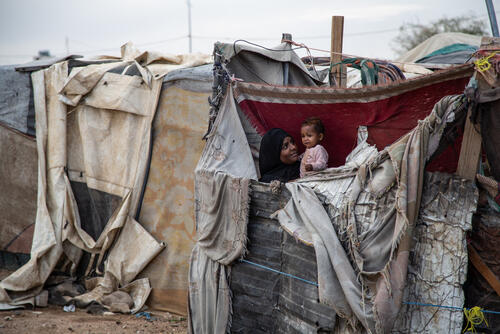
308,900
308,9
75,800
75,8
35,100
35,1

31,000
31,
27,100
27,1
1,150
1,15
Although the number of airstrikes decreased in the last quarter of 2019, ground fighting continued across several governorates throughout the year, as frontlines shifted, causing waves of displacement and many thousands of casualties.
The destruction of health facilities, and shortages of skilled medical staff, medicines and medical supplies, have contributed to the breakdown of the health system.
Médecins Sans Frontières (MSF) worked in 12 hospitals and health centres and provided support to more than 20 health facilities across 12 governorates in Yemen in 2019.
Insecurity and access constraints prevented us – and other organisations – from collecting reliable data on nutritional and humanitarian needs across the country. In Hajjah, Sa’ada, Amran, Ibb and Taiz governorates, our teams treated 7,330 children for malnutrition in inpatient feeding programmes during the year.
Violence against civilians, medical staff and facilities
From the beginning of 2019, our staff witnessed numerous attacks on patients, medical facilities and civilians.
In April, we resumed our activities in Aden surgical hospital after a month of suspension following the kidnapping and killing of a patient. The situation in the city throughout 2019 remained unstable as different groups fought for power. The MSF hospital received mass casualties on several occasions; during an incident in August, our teams treated 119 people in less than 24 hours. In the same month, we performed 800 violence-related surgical interventions.
MSF-supported Al-Thawra hospital in Taiz city was subjected to 11 armed intrusions, during which one patient was killed. We reiterated our call for pledges ensuring the protection and safeguarding of health facilities, medical workers, patients and their caregivers to be upheld and respected.
On 6 November, a hospital we run in Mocha, southwestern Yemen, was severely damaged when surrounding buildings, including a military warehouse, were hit during an aerial attack. Fortunately, there were no casualties and we were later able to reopen the hospital.
MSF and MSF-supported facilities have been hit by aerial attacks six times since the start of the conflict, impeding our ability to provide care.
Assisting the displaced in Hajjah and Ibb governorates
The number of patients seeking healthcare in Abs hospital in Hajjah increased, partly due to ongoing fighting in the north of the district. In October, we admitted more than 7,000 patients to emergency rooms, the highest number since we started supporting the hospital in 2015.
The number of displaced people swelled from 100,000 to approximately 120,000 in the first half of 2019. Many lacked the most basic necessities, such as water, food, shelter and access to medical care. Abs hospital is the only facility providing specialist medical services to over 1.2 million people living in Abs and the surrounding districts.
Ibb, one of the most populated governorates in Yemen, is thought to host hundreds of thousands of displaced people who have fled the frontlines in neighbouring Hodeidah, Ad Dhale and Taiz. MSF runs the emergency room, operating theatre, intensive care unit and inpatient department at the hospital in Dhi As-Sufal district, close to Taiz, which serves a population of several hundred thousand.
Lifesaving care for mothers and children
MSF provides maternal and child healthcare in most of the governorates we support in Yemen. The demand is high and increases each year. On several occasions during 2019, our mother and child hospital in Taiz Houban, in Taiz governorate, was filled to capacity. In 2019, MSF teams assisted 5,900 births in Taiz, Hajjah and Ibb.
Many mothers, children and newborns died in or on arrival at hospitals that MSF runs or supports in Yemen. Many newborns brought to us for care had a low birthweight or were born prematurely, at home or in small private clinics. The most common causes of death among newborns were prematurity, birth asphyxia and sepsis.
The high numbers of deaths are linked to many factors, most of which are a direct result of the war. They include the lack of functioning health facilities, insecurity and active fighting preventing people from seeking care, and an inability to pay for treatment.
In response to the increased maternal and child healthcare needs, MSF started to build a new maternity hospital in Al-Qanawes to serve Hajjah and Hodeidah governorates.
Outbreaks of disease
Outbreaks of infectious diseases are common in Yemen, due to poor sanitation, a lack of clean water, a shortage of vaccines and gaps in the regular vaccination programmes. Between January and April, we admitted 15,265 suspected cholera patients to our facilities and opened cholera treatment centres in Khamer and Taiz, with 50 and 60 beds respectively. Our teams also supported facilities in Abs, Ibb, Kilo and Taiz, and opened two in Sana’a and in Aden. From the end of April, as the number of cholera cases decreased across the country, we either closed facilities or reduced their bed capacity, but remained ready to respond to further outbreaks.
An increase in the number of measles cases was reported between late December 2018 and February 2019. During this period, MSF treated people with measles in Abs, Haydan, Ibb, Khamer and Taiz. In mid-February, the local authorities in the northern governorates launched a measles vaccination campaign, which helped reduce the number of new cases.
Our teams also responded to outbreaks of diphtheria and dengue fever in Ibb, Taiz, Hajja and Haydan governorates, treating 720 people for diphtheria and 4,686 for dengue.



















